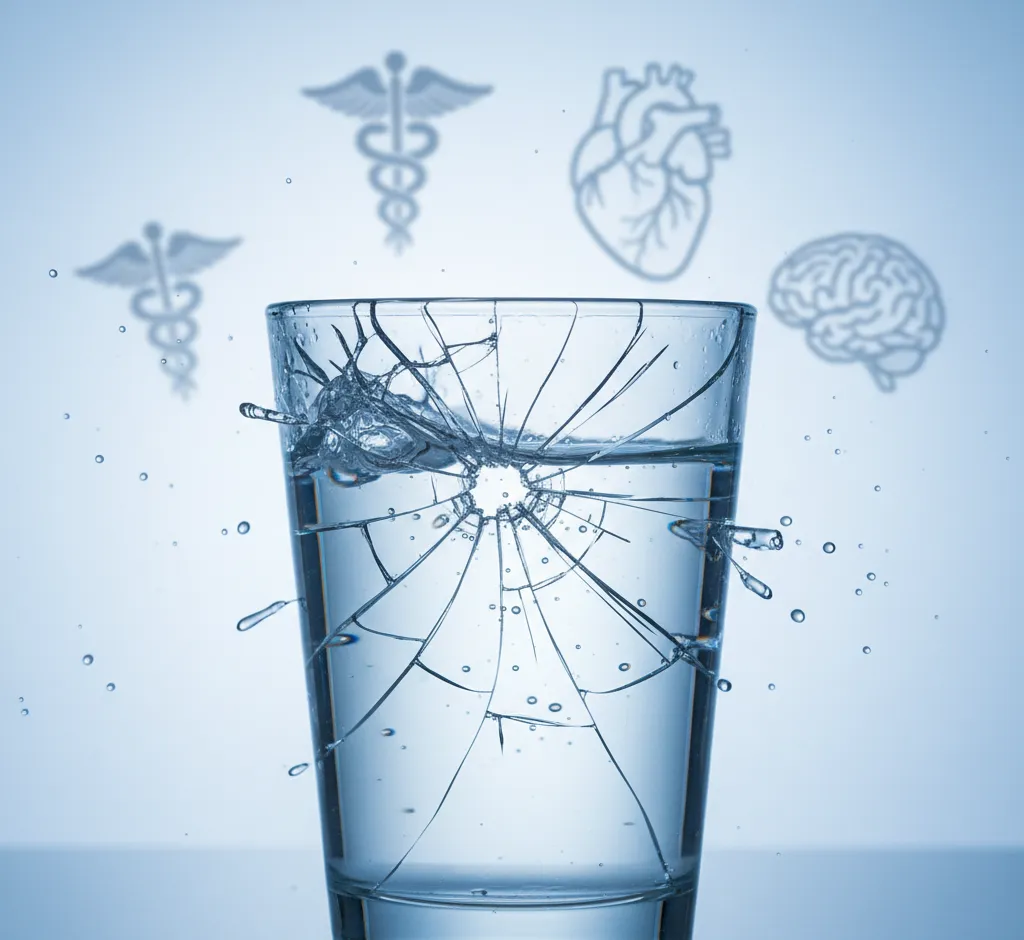The Water Cure Delusion: Debunking the Myth That H₂O Cures All Ailments
Is water a cure-all? Explore the science behind hydration myths, from the '8-glass rule' to hydrogen water, and learn about the real dangers of hyponatremia. Separate proven benefits from pseudoscience.

The Water Cure Delusion: Debunking the Myth That H₂O Cures All Ailments
Water is life. It makes up approximately 60% of the human body and is vital for virtually every physiological process. From regulating body temperature to lubricating joints, its importance cannot be overstated. This fundamental truth, however, has been weaponized by a pervasive wellness myth: the belief that water, particularly in extreme quantities or 'enhanced' forms, is a panacea—a single, magical cure for every affliction, from chronic fatigue to cancer. This notion, often termed the 'water cure' or 'hydropathy,' is a dangerous oversimplification that can delay necessary medical treatment and, ironically, even lead to severe health consequences.
It is time to separate the essential, scientifically-backed benefits of proper hydration from the pseudoscientific claims that promise miracles in a glass. This article will dive deep into the origins of the 'water cure,' examine its modern-day manifestations, highlight the proven role of water in health, and most critically, expose the hidden dangers of believing that H₂O is the answer to all of life's medical problems.
The Historical Roots of Hydropathy and 'Taking the Waters'
The idea of water as a cure-all is not new; it is a concept deeply embedded in history, resurfacing repeatedly throughout the centuries. Ancient Greek, Roman, and Egyptian societies all utilized water for medicinal purposes, often in conjunction with herbal remedies. These practices—known collectively as hydrotherapy or balneotherapy—involved therapeutic bathing in mineral or thermal springs, or ocean bathing (thalassotherapy).
By the 19th century, the 'water cure' experienced a resurgence in popularity, particularly in Europe and America. Spas and hydropathic establishments, like the one visited by Charles Darwin, became trendy resorts where patrons were subjected to regimens of cold plunges, wet towel wraps, and copious water consumption. This movement arose partly as a reaction against the harsh, often ineffective, treatments of traditional medicine at the time. Proponents believed that these water treatments 'strengthened the constitution' and 'removed poisons and toxins'—concepts that, while appealingly simple, lacked any genuine understanding of human physiology or toxicology.
This historical context is crucial. The 'water cure' of the past succeeded primarily because it encouraged rest, a balanced diet (compared to the unhealthy diets of the time), and a strong placebo effect. It was not the water itself curing severe ailments like arthritis or heart disease, but rather the change in lifestyle and environment. Today, these ancient beliefs persist, albeit repackaged in shiny new bottles of 'alkaline,' 'hydrogen-rich,' or 'structured' water.
The Modern Myths: Where Wellness Meets Pseudoscience
In the age of social media, the water cure myth has morphed into several high-tech and often expensive variations. These claims move far beyond simple hydration and venture into the territory of unproven, profit-driven pseudoscience. It is essential to approach any claim that attributes extraordinary, medically curative powers to specially-treated water with intense skepticism.
The Myth of Water Memory (Homeopathy's Foundation)
One of the most extreme pseudo-scientific claims related to water is the concept of 'water memory.' This theory, central to homeopathy, suggests that water retains a 'memory' or 'electromagnetic signature' of substances it once contained, even when diluted to the point where not a single molecule of the original substance remains. This theory defies the fundamental principles of chemistry and physical science. Rigorous attempts to replicate the controversial 1988 study that initially supported this idea have consistently failed. The scientific community has overwhelmingly dismissed 'water memory' as necessary but fanciful, yet it remains a core tenet for a multi-billion-dollar industry.
Hydrogen-Rich and Alkaline Water
Another prominent trend involves marketing water with altered chemical compositions. Alkaline water is advertised as being able to neutralize the body's acidity and prevent disease, despite the fact that the human body's $\text{pH}$ levels are tightly regulated by the kidneys and lungs and cannot be meaningfully changed by drinking water. Furthermore, the $\text{pH}$ of different parts of the body varies widely (e.g., the stomach is highly acidic). Similarly, while preliminary research on hydrogen-rich water (HRW) suggests potential antioxidant and anti-inflammatory effects, the vast majority of studies are small-scale, conducted on animals, or lack the long-term data required to establish HRW as a therapeutic agent for major human diseases. These products are often sold at a significant premium, offering little more than very expensive hydration.
'Detox' and 'Flushing Toxins'
A central pillar of the water cure philosophy is the idea that vast amounts of water will 'flush toxins' from the body. This grossly misunderstands how the body processes waste. Your liver and kidneys are the sophisticated, highly efficient detoxification systems nature intended. While water is essential for these organs to function (e.g., producing urine), simply drinking *more* water than your body needs will not make them work *better* or clear out some mythical buildup of 'toxins.' The concept of 'toxins' used in this context is often vague and medically undefined.
The Scientifically Proven Power of Proper Hydration
Debunking the 'cure-all' claim does not diminish the *true* and *critical* role of water in maintaining health. Proper, adequate hydration is a foundational pillar of well-being, supported by decades of scientific evidence. It’s important to focus on these proven benefits rather than chasing unverified miracles.
- Temperature Regulation: Water acts as a heat sink, and sweat—which is mostly water—is the body's primary mechanism for preventing overheating.
- Joint and Tissue Protection: Water lubricates and cushions joints, and it protects sensitive tissues like the spinal cord and the brain.
- Nutrient and Waste Transport: Water is the medium for blood, which delivers essential nutrients, oxygen, and hormones to every cell and removes metabolic waste products, which are then excreted through urination and bowel movements.
- Cognitive and Mood Function: Even mild dehydration can lead to fatigue, headaches, poor concentration, and a negative shift in mood and cognitive performance. Staying properly hydrated supports optimal brain function.
- Organ Function: Adequate water intake is necessary to prevent kidney stones and urinary tract infections, and it allows the heart to pump blood more easily throughout the body.
Dispelling Common Hydration Myths: Beyond the 8-Glass Rule
The blanket recommendation to drink 'eight glasses of water a day' is another oversimplification. Your individual fluid needs are dynamic and depend on several factors:
- Activity Level: Exercise that causes sweating necessitates significantly higher fluid intake to replenish losses.
- Environment: Hot, humid climates, or high altitudes, increase fluid loss and demand greater replenishment.
- Dietary Intake: Approximately 20% of your daily fluid intake comes from solid foods, especially water-rich fruits and vegetables like watermelon, strawberries, and cucumbers.
- Overall Health: Fever, vomiting, diarrhea, or certain health conditions (like kidney stones or bladder infections) require increased fluid consumption.
The best indicator of proper hydration is listening to your body's thirst mechanism (though you shouldn't wait for extreme thirst) and monitoring your urine color: a pale straw color is the ideal benchmark. Furthermore, the belief that beverages like coffee and tea are inherently dehydrating is largely debunked; the hydrating fluid content outweighs the mild diuretic effect of caffeine.
The Real and Dangerous Risks of Water Overconsumption
Contrary to the myth that 'more is always better,' there is a very real, and potentially fatal, limit to how much water your body can process. Over-reliance on the 'water cure' can lead to a condition known as hyponatremia, or water intoxication.
Understanding Hyponatremia (Water Intoxication)
Hyponatremia occurs when a person drinks so much water that the sodium content in their bloodstream becomes dangerously diluted. Sodium is a critical electrolyte that maintains the balance of fluids both inside and outside your cells. When sodium levels plummet, water rushes into the cells—including the vital cells in the brain—causing them to swell.
The human kidney can process about one liter of fluid per hour. Consuming significantly more than this over a short duration can quickly overwhelm the body's regulatory systems. Symptoms of water intoxication can be vague at first, resembling simple dehydration or fatigue, which often causes people to tragically drink even more water:
- Mild Symptoms: Headache, nausea, vomiting, fatigue, bloating, and muscle cramps.
- Severe Symptoms: Confusion, altered mental status, seizures, coma, and even death, due to increased pressure inside the skull (cerebral edema).
This risk is particularly relevant for endurance athletes who rehydrate with plain water without replacing lost electrolytes, and for individuals with certain underlying medical conditions (such as kidney or heart failure) that impair fluid regulation. It also directly affects those who believe they must follow a radical water cure regimen to purge toxins.
Conclusion: Water as a Necessity, Not a Miracle Drug
Water is an irreplaceable element of human existence. It is the solvent of life, supporting all necessary bodily functions and contributing significantly to physical and cognitive health. However, attributing to it the power to cure all diseases is a dangerous fantasy rooted in historical pseudoscience and modern marketing hype.
The evidence is clear: water is a necessity, not a miracle drug. It will not cure cancer, reverse chronic illness, or flush out medically undefined 'toxins.' The greatest value of water lies in its *essential* role in supporting the body's natural, complex mechanisms. Relying on an extreme 'water cure' instead of seeking evidence-based medical advice for serious conditions can be harmful, delaying effective treatment and potentially causing life-threatening hyponatremia.
The healthiest approach is one of balance: drink water when you are thirsty, monitor your urine color, replace electrolytes during prolonged, intense exercise, and view water as the foundational element of a holistic health strategy that includes professional medical care, a balanced diet, and regular physical activity. Don't believe the hype—believe the science.


